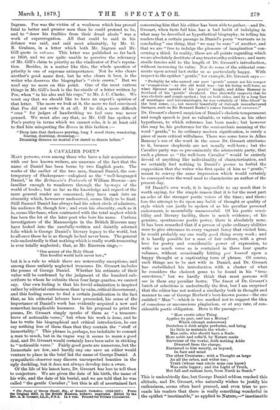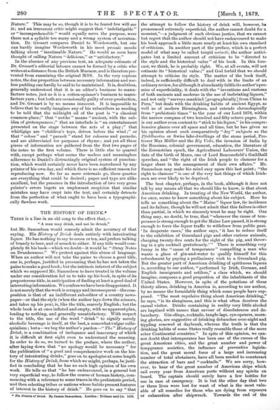A CAVALIER POET.* MANY persons, even among those who have
a fair acquaintance with our less known writers, are unaware of the fact that the name of Daniel has been borne by two English poets. The works of the earlier of the two men, Samuel Daniel, the con- temporary of Shakespeare—eulogised as the " well-languaged Daniel," in the Britannia's Pastorals of William. Browne—are familiar enough to wanderers through the by-ways of the world of books ; but so far as the knowledge and regard of the mere general reader are concerned, they have sunk into an obscurity which, howsoever undeserved, seems likely to be final. Still Samuel Daniel has always had his select circle of admirers, his audience fit, though few ; and even his obscurity, such as it is, seems like fame, when contrasted with the total neglect which has been the lot of the later poet who bore his name. Curious investigators of the Manuscripts in the British Museum may have looked into the carefully-written and daintily adorned folio which is George Daniel's literary legacy to the world, but to all save these he is as though he had never been. The general rule undoubtedly is that nothing which is really worth treasuring is ever totally neglected ; that, as Mr. Emerson sings,—
" One accent of the Holy Ghost
This heedful world hath never lost ;"
but it is a rule to which there are noteworthy exceptions, and. among these unfairly neglected treasures Dr. Grosart includes the poems of George Daniel. Whether his estimate of their value will be confirmed by the judgment of the hundred sub- scribers to whom he submits these four large quartos, we cannot say. Our own feeling is that his fervid admiration is inspired rather by editorial enthusiasm than by calm, critical discernment; and this feeling seems to find a certain justification in the fact that, as his editorial labours have proceeded, his sense of the importance of Daniel's work has evidently acquired a new and somewhat inexplicable keenness. In his proposal to print the poems, Dr. Grosart simply speaks of them as "a treasure- trove of noticeable verse ;" but when his work is done, and he has to write his biographical and critical introduction, he can say nothing less of them than that they contain the "stuff of immortality." This phrase is, perhaps, too indefinite to commit a man to much, but in its vague way it seems to mean a good deal, and. Dr. Grosart would certainly have been safer in sticking to "noticeable verse." Fairly good. poets are numerous, but the Immortals are few, and hardly any one save an editor would venture to place in the brief list the name of George Da,nieL A sympathetic observer may discern unsuspected beauties in the ugly duckling, but it does not always develop into a swan.
Of the life of his latest hero, Dr. Grosart has less to tell than to conjecture. We are given the date of his birth, the name of his wife, and the date of his burial, and, we are told that he was called "the gentle Cavalier ;" but this is all of ascertained fact • The Poems of George Daniel, Esq., of Bestaiet, Yorkshire. (1616-1657.) From the Original MSS. in the British Museum, hitherto imprinted. Edited by the Rev. A. B. Groeart, LL.D., F.B.A. In 4 vole. Printed for Private Circulation.
concerning him that his editor has been able to gather,—and Dr. Grosart, when facts fail him, has a bad habit of indulging in what may be described as hypothetical biography, in telling his readers that a certain passage in Daniel's poem "warrants us in concluding" one thing, that "we may be sure" of another, and that we are "free to indulge the pleasure of imagination" con- cerning a third. In reality, these are all points regarding which we are absolutely destitute of any trustworthy evidence; and mere
sterile fancies add to the length of Dr. Grosart's introduction, without increasing its value. Nor do some of the editorial com- ments upon actual fact strike us as particularly happy. With respect to the epithet "gentle," for example, Dr. Grosart says :— " Probably he who named our poet gentle' meant not his temper- er complexion '—as the old word was—but his being well-born, as when Spenser speaks of his 'gentle' knight, and Allan Ramsay in Scotland of his 'gentle' shepherd. One shrewdly suspects that he was choleric and rough-spoken; but on both sides, and by a long line of marriages and intermarriages, he was certainly of 'blue-blood' in the best sense, i.e., not merely boastfully or through manufactured lineages, such as Sir Bernard Burke's tomes furnish, ad nauseant."
Dr. Grosart's shrewd suspicion of Daniel's choleric temperament and rough speech is just as valuable, or valueless, as his other hypotheses, to which reference has been made ; but however this may be, his preference for the semi-archaic meaning of the- word "gentle," to its ordinary modern signification, is surely a piece of mere critical wilfulness. There was some force in Allan
Ramsay's use of the word in the sense Dr. Grosart attributes to it, because shepherds are not usually well-born ; but the- Cavalier party was so pre-eminently the aristocratic party, that such a phrase as "the well-born Cavalier" would be entirely devoid of anything like individuality of characterisation, and we certainly find nothing in Daniel's poems to forbid the-
supposition that the writer who first spoke of him as "gentle," meant to convey the same impression which would certainly be conveyed were the word used to characterise an author of the- present day.
Of Daniel's own work, it is impossible to say much that is worth saying, for the simple reason that it is for the most part an echo of the stronger poetic voices of the time ; and there- fore the attempt to fix upon any habit of thought or quality of style which can justly be spoken of as his peculiar personal endowment, is mournfully unsuccessful. Of his poetic sensi- bility and literary facility, there is much evidence ; of his genuine, spontaneous poetic power, there is absolutely none.. It has been remarked that if a person of quite ordinary abilities were to give utterance to every vagrant fancy that visited him, he would probably say one really good thing every week ; and it is hardly possible for a man of fair culture, with a great
love for poetry and considerable power of expression, to, write as much verse as is contained in these four quarto volumes, without occasionally hitting par hasard upon a
happy thought or a captivating turn of phrase. Of course, such things are to be met with in Daniel, and Dr. Grosart has embellished his introduction with a cluster of what he considers the choicest gems to be found in his "trea- sure-trove," but we hardly think that most persons will see in them any peculiar lustre. The finest of Dr. Grosart's batch of selections is undoubtedly the first, but I am surprised that the editor has not noticed a similarity both in thought and manner to one of George Herbert's best-known poems—the one entitled "Man "—which is too marked not to suggest the idea, of conscious or unconscious plagiarism, or at any rate, of con- siderable poetic obligation. Here is the passage :—
" How everie other Thing
Applies its part, and has a Motion! Which (though unknowne) Doubtless it doth aright performs, and bring Its little to maintain the whole : Man onlie, who should have a Soule More noble and refin'd, by Nature made Surveiour of the worke, doth nothing Adds Diverted from the charge, Entreated to him meerly, as beyond, In face and mind
The other Creatures; with a Thought as large
As all the orbes, and wider too ; Truth (whose vast circle none can know) Was onlie bigger; and the Light of Truth, Met full and radiant here, from North to South."
This is undoubtedly fine, but George Daniel seldom reached this altitude, and Dr. Grosart, who naturally wishes to justify his enthusiasm, seems often hard pressed, and even tries to per- suade his readers that there is really something wonderful in the epithet "inestimable," as applied to Nature,--" inestimable Nature." This may be so, though it is to be feared few will see it; and an irreverent critic might suggest that " indefatigable " 4)r " incomprehensible " would equally serve the purpose, were there not a syllable too many and a wrong system of accentua- tion. Dr. Grosart compares Daniel to Wordsworth, but one can hardly imagine Wordsworth in his most prosaic moods talking about "inestimable Nature." He would as soon have .thought of calling Nature "delicious," or "satisfactory."
In the absence of any previous text, an adequate estimate of
Grosart's editorial labours cannot be formed by a critic who writes at a distance from the British Musuem, and is therefore pre- vented from examining the original MSS. In the very copious notes, the due proportion between necessary information and use- less padding can hardly be said to be maintained. It is, doubtless, generally understood that it is an editor's business to manu- facture notes, just as it is a cotton-spinner's business to manu- facture yarn ; but both are occasionally guilty of over-production, and Dr. Grosart is by no means innocent. It is impossible to believe that he really imagines any of his subscribers as needing to be told that the midnight oil of the poet is "a classical .common-place;" that " antike " means "ancient, with the sub- idea of grotesqueness ;" that an interlude is "an entertainment presented on the stage between the acts of a play ;" that whirligigs are "children's toys, driven before the wind ;" or that " coloss " and " para.sit " stand for colossus and parasite, and are abbreviated for purposes of rhyme ; and yet all these pieces of information are gathered from the first two pages of the notes to the first volume. There is little else to quarrel -with, except perhaps what seems the useless and meaningless adherence to Daniel's distractingly original system of punctua- tion, which would certainly never have been reproduced by any printer of his own day, and which there is no sufficient reason for reproducing now. So far as mere externals go, these quartos are everything that could be desired ; paper and type are alike excellent, but the presence in the introduction of two very gross printer's errors begets an unpleasant suspicion that similar mistakes may have crept into the text, and certainly detracts from the perfection of what ought to have been a typographi- zany flawless work.



































 Previous page
Previous page